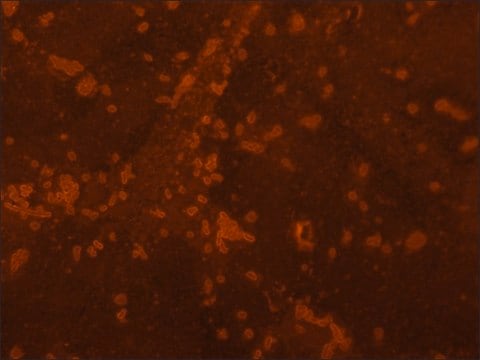MBD0002
Microbial DNA standard from Proteus mirabilis
Suitable for PCR, sequencing and NGS
About This Item
Produits recommandés
Niveau de qualité
Forme
liquid
Concentration
10 ng/μL
Technique(s)
DNA extraction: suitable
DNA sequencing: suitable
PCR: suitable
Conditions d'expédition
ambient
Température de stockage
−20°C
Catégories apparentées
Description générale
Proteus mirabilis is a gram negative facultative anaerobic rod-shaped bacterium. Bacteria of the genus Proteus of the family Enterobacteriaceae are opportunistic human pathogens responsible for wound and burn infections as well as skin, eye, ear, nose, throat, urinary tract, and gastrointestinal infections and bacteremias.2 The most common infection involving P. mirabilis occurs when the bacteria, which is a member of the natural intestinal flora, moves to the urethra and urinary bladder causing urinary tract infection. The outer-membrane lipopolysaccharide (LPS) is considered an important virulence factor of Proteus.3 Arabski et al. suggest that the immunological response against P. mirabilis LPS might play a role in rheumatoid arthritis.4 A possible correlation between the abundance of P. mirabilis in the intestine and obesity was suggested recently.5
Read here how to use our standards to ensure data integrity for your microbiome research.
Application
Caractéristiques et avantages
- Individual microbial standard for microbiomics and meta-genomics workflow
- Suitable standard for PCR, sequencing and NGS
- Improve Bioinformatics analyses
- Increases reproducibility
- Compare results lab to lab
Forme physique
Code de la classe de stockage
12 - Non Combustible Liquids
Classe de danger pour l'eau (WGK)
WGK 1
Point d'éclair (°F)
Not applicable
Point d'éclair (°C)
Not applicable
Certificats d'analyse (COA)
Recherchez un Certificats d'analyse (COA) en saisissant le numéro de lot du produit. Les numéros de lot figurent sur l'étiquette du produit après les mots "Lot" ou "Batch".
Déjà en possession de ce produit ?
Retrouvez la documentation relative aux produits que vous avez récemment achetés dans la Bibliothèque de documents.
Articles
DNA standards enhance metagenomics research integrity, offering precise species study and mixed community standards.
DNA standards enhance metagenomics research integrity, offering precise species study and mixed community standards.
DNA standards enhance metagenomics research integrity, offering precise species study and mixed community standards.
DNA standards enhance metagenomics research integrity, offering precise species study and mixed community standards.
Notre équipe de scientifiques dispose d'une expérience dans tous les secteurs de la recherche, notamment en sciences de la vie, science des matériaux, synthèse chimique, chromatographie, analyse et dans de nombreux autres domaines..
Contacter notre Service technique








